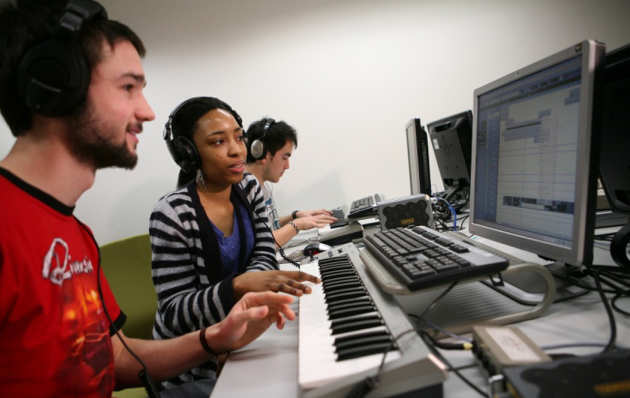Module details
- Offered to 1st years
- Tuesdays 16.00-18.00
- 8 weeks (autumn or spring term)
- Planned delivery: On campus (South Kensington)
- Non-credit only
This module covers sound and music with a focus on its contexts in biology, physics, maths, engineering and technology. This interdisciplinary module shows how music and science are connected on a fundamental level.
The Sound Technology module also offers you the opportunity to create electronic music using state-of-the-art equipment. The practical aspects of the module are embedded in a theoretical and analytical framework which encourages the critical evaluation of contemporary music.
Sound technology bridges artistic practice and cutting-edge technology, providing a platform where you can discover, develop and explore scholarship in the field as well as being creative, both individually and as part of a group.
Information blocks

On successful completion of this module, you will be able to:
-
Analyse and describe how recording technology is used to capture and manipulate sounds.
-
Apply the basic compositional processes which are used when creating an original composition of field recording.
-
Sound, psychoacoustics and the brain
-
Capturing sounds
-
Soundscapes
-
Introduction to the Digital Audio Workstation
-
Introduction to digital audio, sampling and effects
-
Music composition in the digital age
-
Group presentations by students
- We use the module VLE extensively as the backbone for delivery and assessment of the module.
- We allow and encourage you to borrow equipment such as portable recorders and microphones so they can work independently outside the music technology lab.
- We use YouTube videos to deliver content and as a starting point for class discussions.
- We use a wide range of external web resources during class.
- We use a Digital Audio Workstation as the main tool to create your portfolio.
You will be provided with feedback on your presentation via the module VLE, which will feed into your final assessment. Your composition/field recording, and accompanying notes will be submitted via the module VLE. Written feedback for this will be provided through the VLE.
- Coursework: Original composition or field recording - audio approx. 3-5 minutes and supporting written work approx. 700 words (70%)
- Practical: Group Presentation - basic analysis of a commercially released composition in groups of 4, delivering a PowerPoint presentation of maximum 20 minutes (30%)
- ECTS value: 0
- Requirements: You must be prepared to attend all classes and to spend about an hour a week preparing for each session
- This module is designed as an undergraduate Level 4 course. For an explanation of levels, view the Imperial Horizons Level Descriptors page.
"The sessions are stimulating and engaging."
"Really enjoyed the module, particularly the work on acoustics and the session with the music therapist. It was a good introduction to music tech."
"I enjoyed the interactive mini-lectures, particularly the ones which focused on the way we hear, and the physics of sound waves"
"Loved the course so much. Will definitely go back to music tech."
Got any questions?
Contact the lecturers
Mr Paul Chauncy
p.chauncy@imperial.ac.uk
Mr Toni Castells
t.castells@imperial.ac.uk
